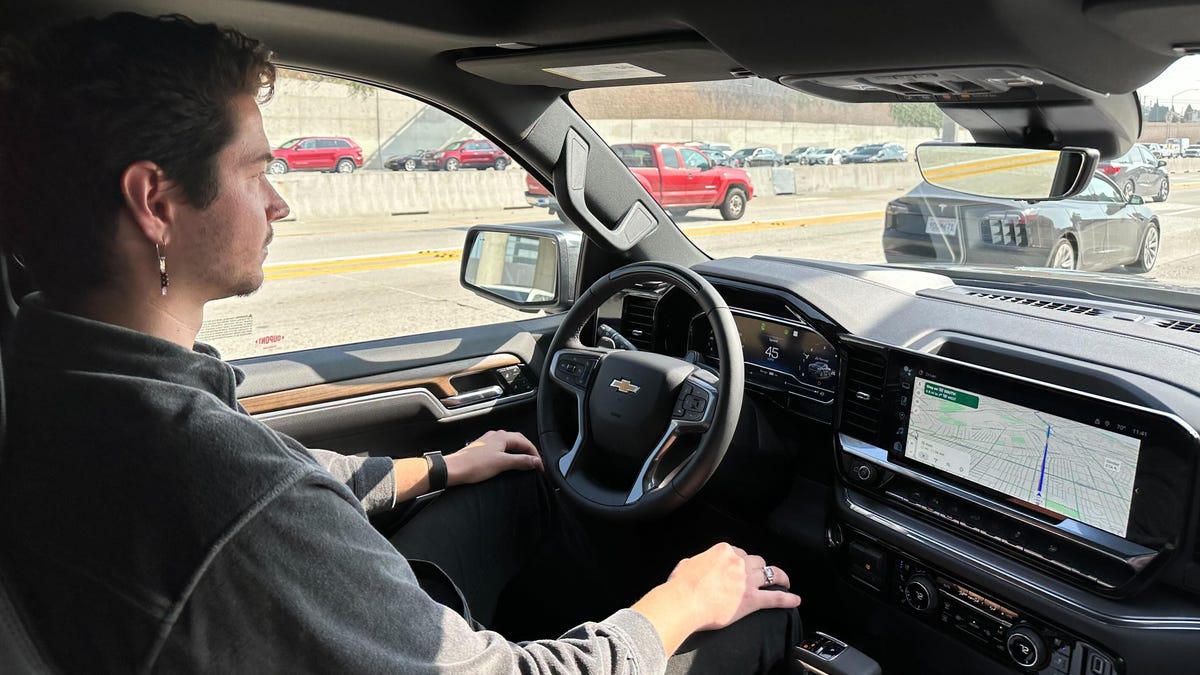Chevrolet’s Super Cruise is a Level 2 automated driving system that, through a series of complicated technology, allows hands-free semi-autonomous driving on specific approved roadways. I have a big history with Advanced Driver Assistance Systems (or ADAS) technology, since I was a test driver for two years with Mercedes-Benz Research and Development, where I worked on Mercedes’ Level 3 Drive Pilot system. But until last week, I had neither tried out Super Cruise nor had I ever towed a trailer before, because the prospect of towing was horrifying.
My daily driver is a 2017 Mini Cooper, so I’m not even used to driving an average sized car let alone a full-size truck towing a 23-foot trailer. As you might imagine, when Chevrolet invited me to experience towing a trailer through Los Angeles while using the Super Cruise technology in a Silverado pickup, I was still nervous as hell but excited to experience it nonetheless.
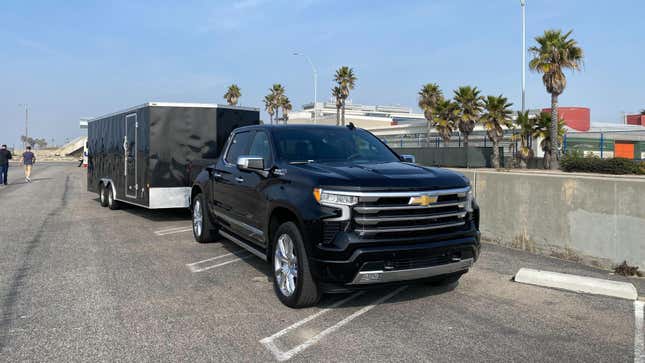
Once I got behind the wheel of the 2024 Chevrolet Silverado High Country and set off, I was eager to get to the freeway and engage Super Cruise so I didn’t have to be the only one controlling this nearly 50-foot-long setup. The Silverado made my job easier by projecting a camera feed from my mirrors onto the infotainment screen whenever I switched on a turn signal, and it even superimposes a transparent red rectangle onto the lane next to me to show my footprint with the trailer included, which took the guesswork out of lane changes while towing. As someone with no towing experience, I thoroughly appreciated these features.
Once I made it to the freeway I turned on the regular cruise control, and Super Cruise became sporadically available as indicated by a steering wheel icon on the driver’s display. To activate Super Cruise, you press the cruise control button again, and the system phases in. Once the light bar that’s integrated into the top portion of the steering wheel rim glows solid green, the system is active and drivers can take their hands off the wheel.
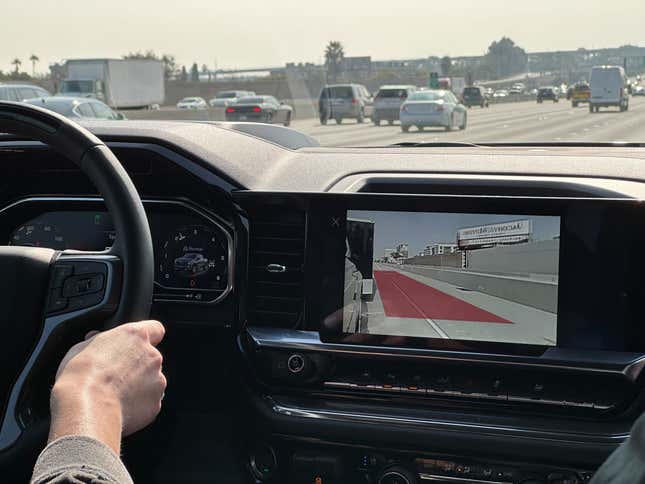
In my time as a Mercedes test driver, I was never supposed to take my hands off the wheel in case of emergency, so when Jeff Miller, my copilot and the assistant chief engineer of Super Cruise, reminded me I could let go of the steering wheel, I was skeptical. Once I did release the sweaty death grip, Super Cruise impressed me.
When you’re towing, the truck identifies the trailer weight by monitoring engine strain and other forces, and Super Cruise adjusts the gap between the truck and the vehicle ahead of it to account for increased braking distances. Drivers can still select between three follow distances that have all been adjusted to accommodate the load.
Super Cruise offered reliable lane centering and no big surprises, but I did have a slight pucker moment when a car very quickly cut through my lane to make an exit. The system didn’t do much in the quick moment that the offending car was decelerating in front of me, but the other party continued their last-minute merge, and I encountered no other pucker-worthy instances like this.
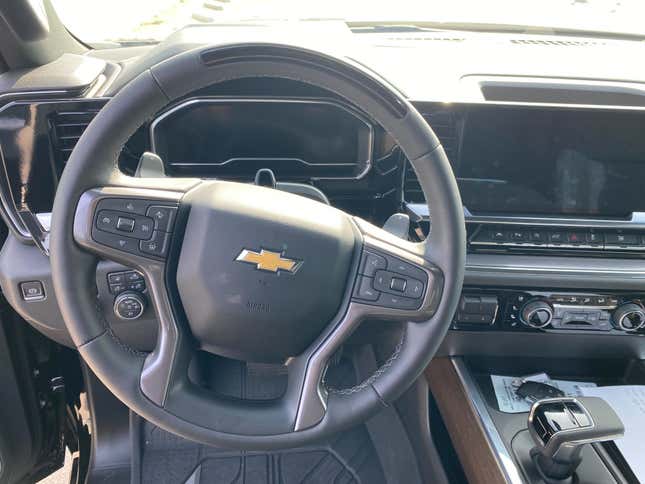
That brings me to Super Cruise’s limitations. When towing, Super Cruise won’t initiate or perform lane changes, which makes sense and really isn’t that big of a deal. The biggest thing to remember when using Super Cruise is that the driver is always 100 percent liable for anything that happens when the system is active. Drivers must keep their eyes on the road while Super Cruise is on, and a driver monitoring camera assures that. Super Cruise is only a Level 2 automated system, so even when the system is active, drivers are not free to use their phones or watch Netflix on the infotainment screen — they must remain vigilant of the road ahead, despite the unique benefit of being able to leave their hands off the wheel.
Despite these limitations, and somewhat frequent system disengagements during my very short haul due to various map issues, engaging Super Cruise took a lot of the stress out of my first towing adventure, and I found myself wanting to engage the system so I could worry less. In California vehicles with three or more axles are limited to 55 miles per hour; that pace can get monotonous, so I enjoyed being able to chuck the system on and let the technology remove some of the humdrum nature of the drive.
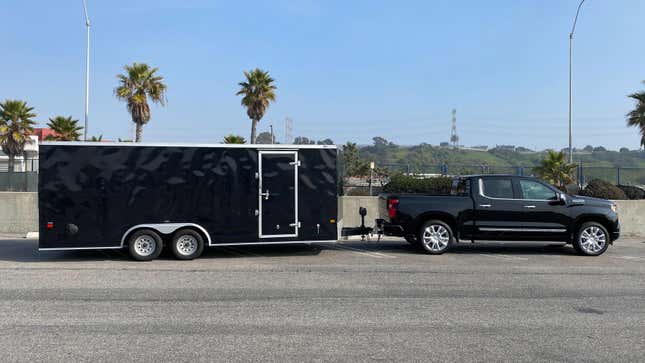
Unfortunately Super Cruise is only available on Silverados in High Country trim and a crew cab, short bed configuration. It’s currently listed online as a part of the $6,200 High Country Premium II package that actually requires the addition of two other packages, with the total cost of adding Super Cruise totaling around $7,300. The cheapest Silverado you can buy with Super Cruise costs a bit above $70,000.
A Super Cruise subscription is included for three years with the purchase of a new Silverado that has the system equipped, but after those three years, Super Cruise will cost users $25 per month for the remainder of the vehicle’s life.
Super Cruise mitigated a lot of my ever-present anxiety, and the camera feature for lane changes helped immensely, too. For experienced towers who take pride in the hairy-chested task of towing a trailer unassisted, Super Cruise might not have quite as much appeal, but I think it’s a great option for anyone who tows — especially for folks who are new to towing or get stressed out by the thought of pulling a trailer.

